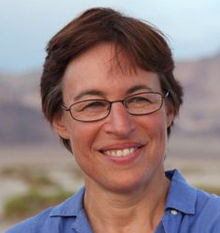Lynn Justine Rothschild | |
|---|---|
 | |
| Born | May 11, 1957 |
| Nationality | American |
| Alma mater | Yale University (BS), Indiana University (MA), Brown University (PhD) |
| Known for | Extremophiles at NASA, and founding the synthetic biology program for NASA |
| Scientific career | |
| Fields | Biology |
| Institutions | NASA’s Ames Research Center, Brown, Stanford, UC Santa Cruz |
| Thesis | Assessment of evolutionary relationships among protistan phyla and a blue-green prokaryote by comparison of the enzyme ribulose-1,5-bisphosphate carboxylase. (1985) |
| Doctoral advisor | Annette W. Coleman |
| Other academic advisors | Tracy Sonneborn, Susan Gerbi |
Lynn Justine Rothschild FLS (born May 11, 1957) is an evolutionary biologist, astrobiologist and synthetic biologist at NASA's Ames Research Center,[2][3][4] and is an adjunct professor at Brown University.[5] She is an Adjunct Professor at Stanford University, where she teaches Astrobiology and Space Exploration. At Ames, her research has focused on how life, particularly microbes, has evolved in the context of the physical environment, both on Earth and potentially beyond our planet's boundaries. Her research also explores the use of synthetic biology as an enabling tool for space travel.[4] Since 2007, she has studied the effect of UV radiation on DNA synthesis, carbon metabolism and mutation/DNA repair in the Rift Valley of Kenya and the Bolivian Andes, and also in high altitude experiments atop Mount Everest, in balloon payloads with BioLaunch. She was the principal investigator of the first free-flyer synthetic biology payload which flew on the DLR EuCROPIS mission. In 2024, she received a Phase III NIAC grant to explore the use of fungi for constructing habitats on the Moon or Mars.[6]
Rothschild graduated from Yale University in 1978 and earned a Ph.D. from Brown University in 1985.[4][5] In addition to leading her research group at Ames, she serves as the Bio and Bio-Inspired Technologies, Research and Technology Lead for NASA Headquarters Space Technology Mission Directorate.[4] Rothschild founded the Astrobiology Science Conferences and the International Journal of Astrobiology.[4] From 2011-2019, she served a faculty Advisor for the Stanford-Brown iGEM teams, which utilized synthetic biology to advance NASA's mission objectives, including BioWires and a biodegradable drone.[4]
- ^ "Address Book". Linnean Society. Burlington House, London. Retrieved 15 July 2022.
- ^ "To Survive on Mars, BYO Bacteria" Science Friday. Retrieved 2017-03-14.
- ^ Lynn Rothschild. Archived 2011-09-09 at the Wayback Machine NASA 2011. Retrieved 14 September 2011.
- ^ a b c d e f "Lynn J. Rothschild - NASA". Retrieved 2024-08-17.
- ^ a b "Rothschild, Lynn". vivo.brown.edu. Retrieved 2024-08-17.
- ^ "NASA Advances Research to Grow Habitats in Space from Fungi - NASA". Retrieved 2024-08-17.